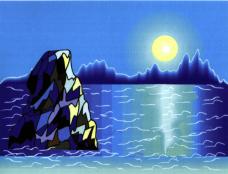Extremophiles
As science explores volcanos, deep sea vents, geyser pools, glacial
areas, and mountain tops at very high elevations one of the surprising
things that has been discovered is that bacteria grow in unbelievable
conditions on the earth. These bacteria are designed to withstand
extreme conditions, and they are called extremophiles. There are seven
categories that have been identified. They are:
Thermophiles--organisms
that thrive in temperatures from 120° to 160°F found in hot
springs and deep sea vents.
Hyperthermophiles--organisms
that grow in temperatures from 176° to 235°F and will not grow
in conditions lower than 176°F.
Psychrophiles--organisms
that cannot survive temperatures warmer than 54°F and grow best at
39°F.
Acidophiles--organisms that
require a highly acidic place to grow (ph values less than 2). Volcanic
pools and hot sea vents are the most common places where these
organisms are found.
Alkalophiles--bacteria
requiring alkaline conditions to grow (ph values greater than 10),
usually desert lakes.
Halophiles--organisms
requiring salt contents of 20-30%, usually found in salt mines.
Barophiles--organisms
requiring high pressures to grow--hundreds of times greater than the
earth's surface. In the Marianna Trench some of these forms flourish at
pressures 700 times the sea level air pressure.
 What is interesting about these extremophiles is that
they all serve
major roles in the overall design of life on earth. In recent years
science has found that there is a whole ecosystem functioning around
vents in the very deep ocean. The ecosystem has sixteen foot long
worms, shrimp, large clams, and a variety of fish. The extremophile
bacteria are the basis of the food chain and their presence allows life
to flourish and interact with other forms of life around the deep sea
vents.
What is interesting about these extremophiles is that
they all serve
major roles in the overall design of life on earth. In recent years
science has found that there is a whole ecosystem functioning around
vents in the very deep ocean. The ecosystem has sixteen foot long
worms, shrimp, large clams, and a variety of fish. The extremophile
bacteria are the basis of the food chain and their presence allows life
to flourish and interact with other forms of life around the deep sea
vents.
Bacteria that can handle high acidity, high alkalinity, and high
salinity, serve to take environments hostile to normal forms of life
and make them less hostile. Bacteria can reduce the conditions so they
are less extreme. Old volcanos can eventually become lakes teeming with
fish and other aquatic forms of life. Salty lakes can be reduced to
brackish and eventually fresh water if more salt is not added. These
extremophiles are agents designed to make more and more areas of the
earth fit for life.
As man looks at pollution problems and at the possibility of life
elsewhere in the solar system, it is obvious that these complex life
forms that function in terrible conditions may have much to teach us
and many ways to help us in meeting the problems mankind faces in the
twenty-first century.
Back to Contents
Does God Exist?, SepOct04.
 What is interesting about these extremophiles is that
they all serve
major roles in the overall design of life on earth. In recent years
science has found that there is a whole ecosystem functioning around
vents in the very deep ocean. The ecosystem has sixteen foot long
worms, shrimp, large clams, and a variety of fish. The extremophile
bacteria are the basis of the food chain and their presence allows life
to flourish and interact with other forms of life around the deep sea
vents.
What is interesting about these extremophiles is that
they all serve
major roles in the overall design of life on earth. In recent years
science has found that there is a whole ecosystem functioning around
vents in the very deep ocean. The ecosystem has sixteen foot long
worms, shrimp, large clams, and a variety of fish. The extremophile
bacteria are the basis of the food chain and their presence allows life
to flourish and interact with other forms of life around the deep sea
vents.